Classics 301B
February 18, 2025
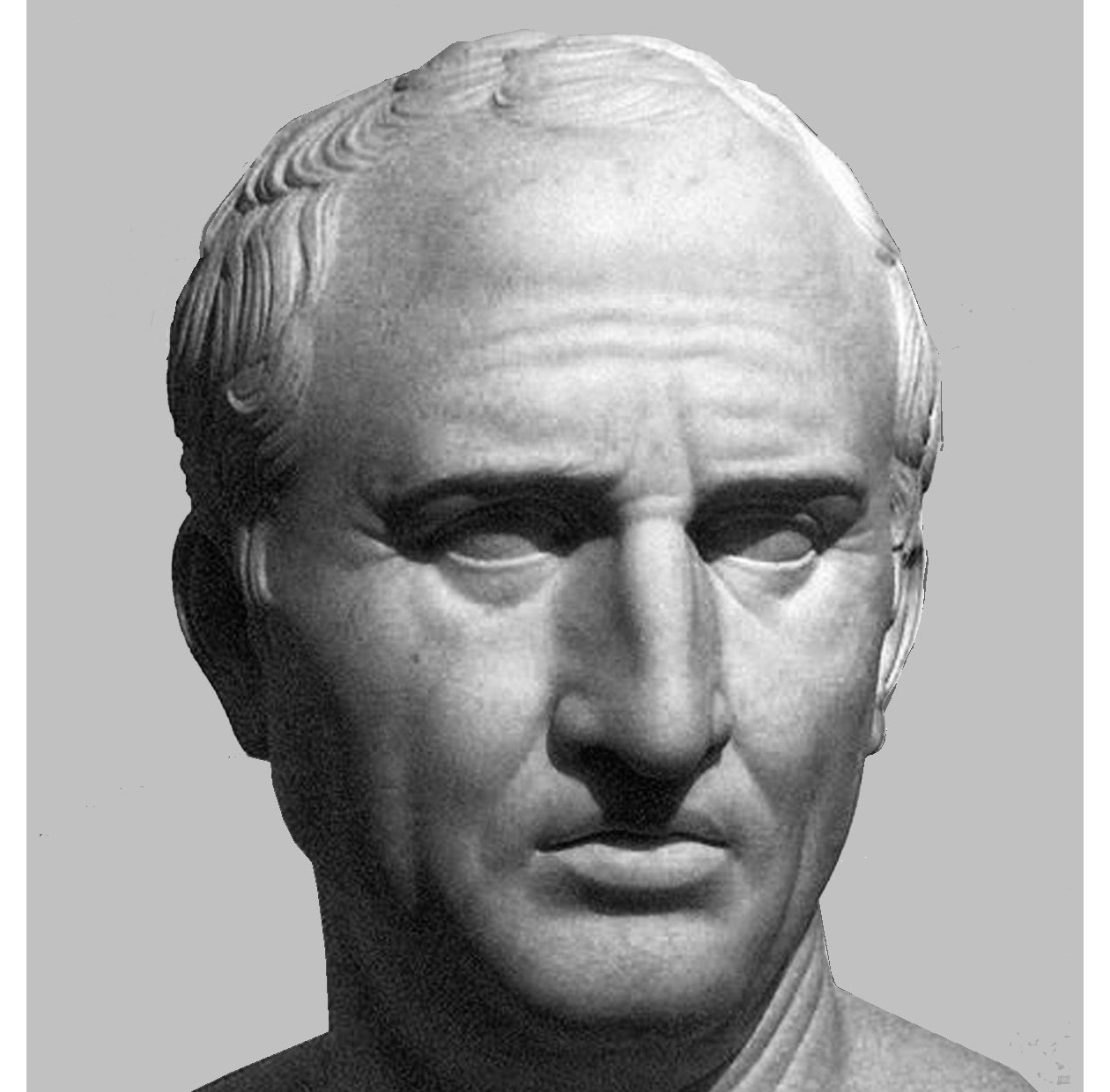
Marcus Tullius Cicero (106-43 BCE)
Study Guide for Examination #1 (Thursday, February 20)
Letters (before TikTok, Instagram, texting, email): communication creating presence in absence, collapsing time & space, self-fashioning an image to audience

- Greco-Roman Letters (Epistulae): usually papyrus (reed pen, ink, rolled, delivered by couriers), letter in Homer (Bellerophon, Iliad), common by 5th century BCE for official political & military correspondence (private persons with message too complex for oral messengers); Pseudolus?
- Letters a diffuse literary genre: shared conventions (“A greets B” & “farewell”) but varied uses, e.g. political/propagandistic, philosophical (Seneca), scientific; Romans develop poetic epistles, e.g. Ovid’s Heroides; Roman tradition includes letters of recommendation (e.g. Letter 115, freedman Apollonius re Caesar's memoirs in Greek), requests for patronage, consolations for personal loss
- published letters of public figures (Cicero, Pliny): historical occasions, but autobiographic self-(re)presentation (Cicero: public image, status, legacy)
- Marcus Tullius Cicero (106-43 BCE): 900+ letters, many to Atticus & other friends, famous individuals (Julius Caesar, Brutus, Cassius, Antony), family members
- Cicero’s letters of 49-43 BCE: correspondence in conversational style, few rhetorical flourishes (as speeches); Greek code-switching (French in our translation); literary intertexts, e.g. "I fear the Trojans" (Hector, Iliad 22.105 in Letter 74, of critical optimates); planned to publish selection of letters himself, secretary Tiro edits & publishes posthumously
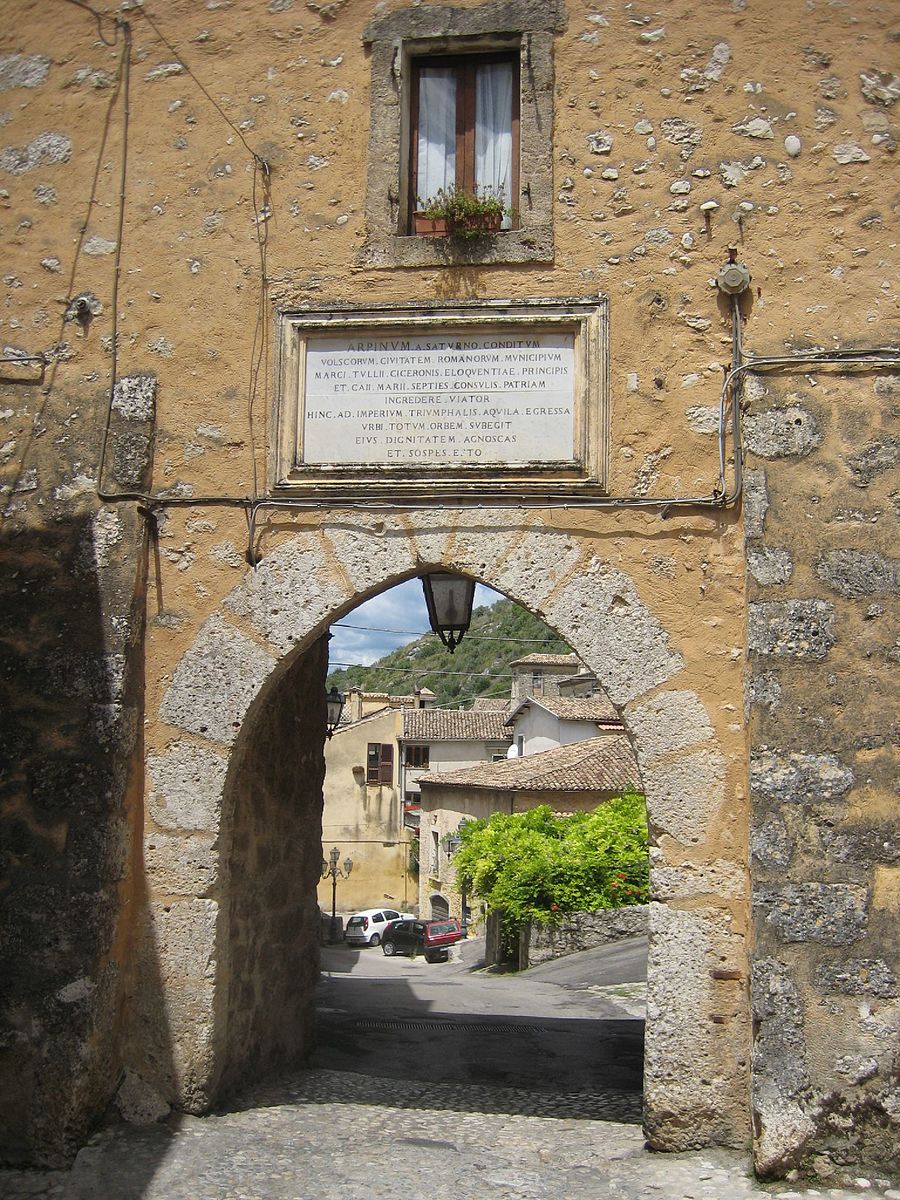
Porta Saturno, Arpino (Italy)
Cicero’s life & times (106-43 BCE): contextualizing the letters
- born in Arpinum, Italy, novus homo (“new man”) in Rome: wife Terentia (e.g. Letter 82, "you are more courageous than any man" as he leaves for Greece, June 49 BCE) until divorce (46 BCE) & marries teenager (Publilia); daughter Tullia who dies in childbirth (45 BCE; e.g. Letter 119, "I have written a literary consolation to myself"; shrine in Letters 120 & 123); son Marcus; son-in-law Dolabella (e.g. care of female family members in Letter 70); freedman & literary secretary Tiro (e.g. Letter 68, Tiro sick in Greece as crisis looms in Rome)
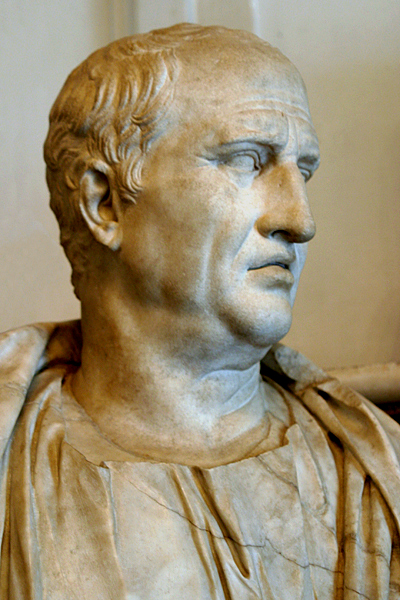
- wealthy through legal advocacy (Italian villas); financial challenges in aftermath of civil war & divorce (e.g. repayment of Terentia's dowry, Letter 120)
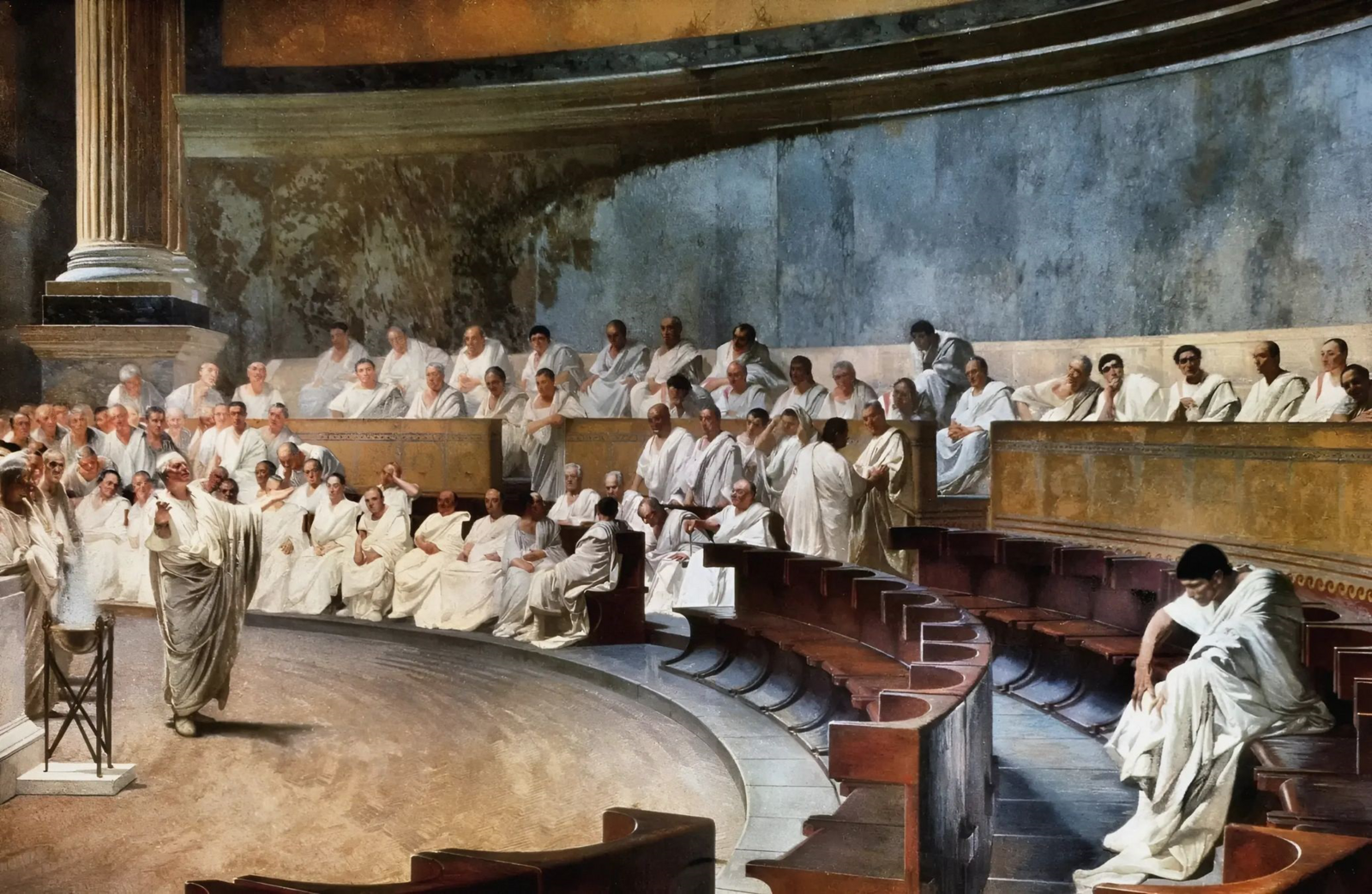
Maccari, Cicero Denounces Catiline (1889)
- defining consulship (63 BCE): conspiracy of Catiline – Cicero exiled (58 BCE), declining influence – self-promotion (narcissism?); seeking approval of elite peers, obsessed with status, authority, influence (e.g. lictors)
- governor of Cilicia (Asia Minor, 51-50 BCE): just returned & near Rome in January 49 as Caesar crosses Rubicon (Letters 68-70)
- political position: “new man” embraces Republican oligarchy & senatorial paternalism; advocates compromise vs. violence & factionalism of Civil War period – champion of concordia ordinum (harmony of senatorial & equestrian factions)
- never fully supports Pompey: constitutional alternative to Caesar (demagogue, autocrat); ineffectual fence-sitter in Civil War
- Caesar’s clementia after Battle of Pharsalus (48 BCE): Cicero withdraws from public life (philosophy); Pompeians defeated at Battle of Thapsus without Cicero's support (46 BCE; Cato the Younger's suicide) & Battle of Munda (Spain, 45 BCE) ends conflict (Cicero an outsider)
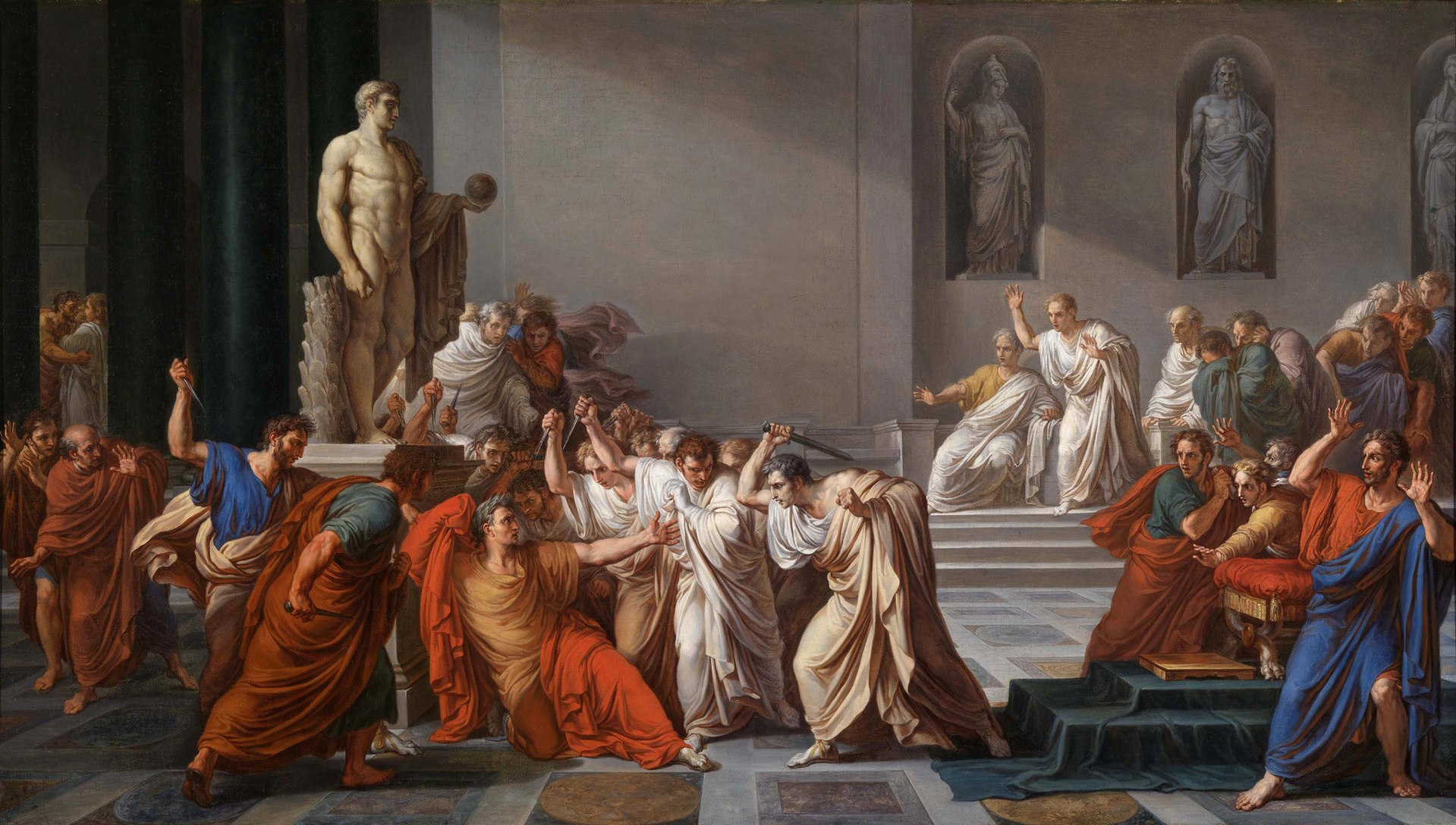
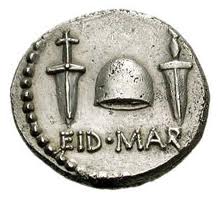
Camuccini, Death of Caesar (1798)
- Julius Caesar named dictator for life: Cicero not part of assassination (44 BCE), but conflict with Caesar’s lieutenant Mark Antony (Philippics)
Cicero, Philippics 2.15
Antony is celebrating a birthday feast at his villa. In whose honor? I will name no one. Suppose it is in honor of some Phormio, or Gnatho, or even Ballio. Oh the abominable profligacy of the man! Oh how intolerable is his impudence, his debauchery, and his lust!
- Caesar’s nephew & heir Octavian's reconciliation & alliance with Antony (+ Lepidus, triumvirate, 43 BCE) leads to Cicero’s proscription & death after failed attempts to mentor/control Octavian (Letters 136-137, 160, 164-165)
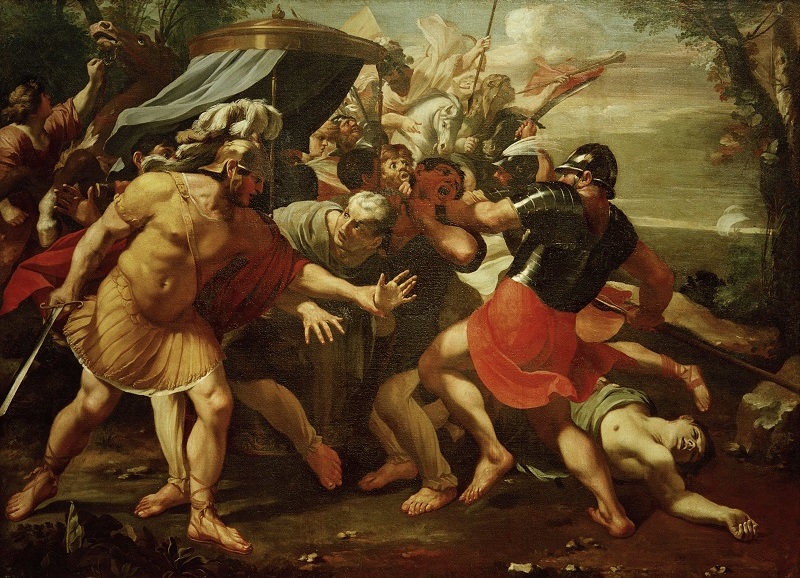
Perrier, The Death of Cicero (ca. 1635)
Death of Cicero in Rome (2005): https://www.youtube.com/watch?v=vhnplk46xLI
- Cicero’s death & mutilation (December 7, 43 BCE), described by historiographer Livy (preserved by Seneca, Suasoria 6.17):
Cicero had withdrawn from Rome before the imminent arrival of the triumvirs. He regarded as inevitable what actually ensued, that he would no more be delivered from the clutches of Antony than Brutus and Cassius could escape from Caesar . . . he journeyed to his residence at Formiae, intending to take ship from Caieta. From there he put out to sea several times, but at one moment he was carried back by adverse winds, and at the next he was unable to endure the ship’s tossing induced by the groundswell. Eventually he tired of both flight and life, and he retired to his house further inland . . . ‘I shall die,’ he said, ‘in the fatherland which I often have delivered.’ It is well established that his slaves were ready to fight bravely and faithfully, but Cicero himself bade them lay down the litter, and to endure without a struggle the necessity imposed by an unjust fate. As he leaned from the litter, and offered his neck without resistance, his head was hacked off. This was not enough for the soldiers’ heartless cruelty; they also hacked off his hands, reproaching them for having penned words injurious to Antony. His head was accordingly carried back to Antony, and on his instructions it was set between his hands on the rostra, where as consul, and on numerous occasions as a consular, and in that very year in opposing Antony, he had been greeted with adulation for his eloquence greater than had ever been accorded to any human voice. Men could scarcely raise their eyes, blinded with tears, to gaze on his slaughtered bodily parts.
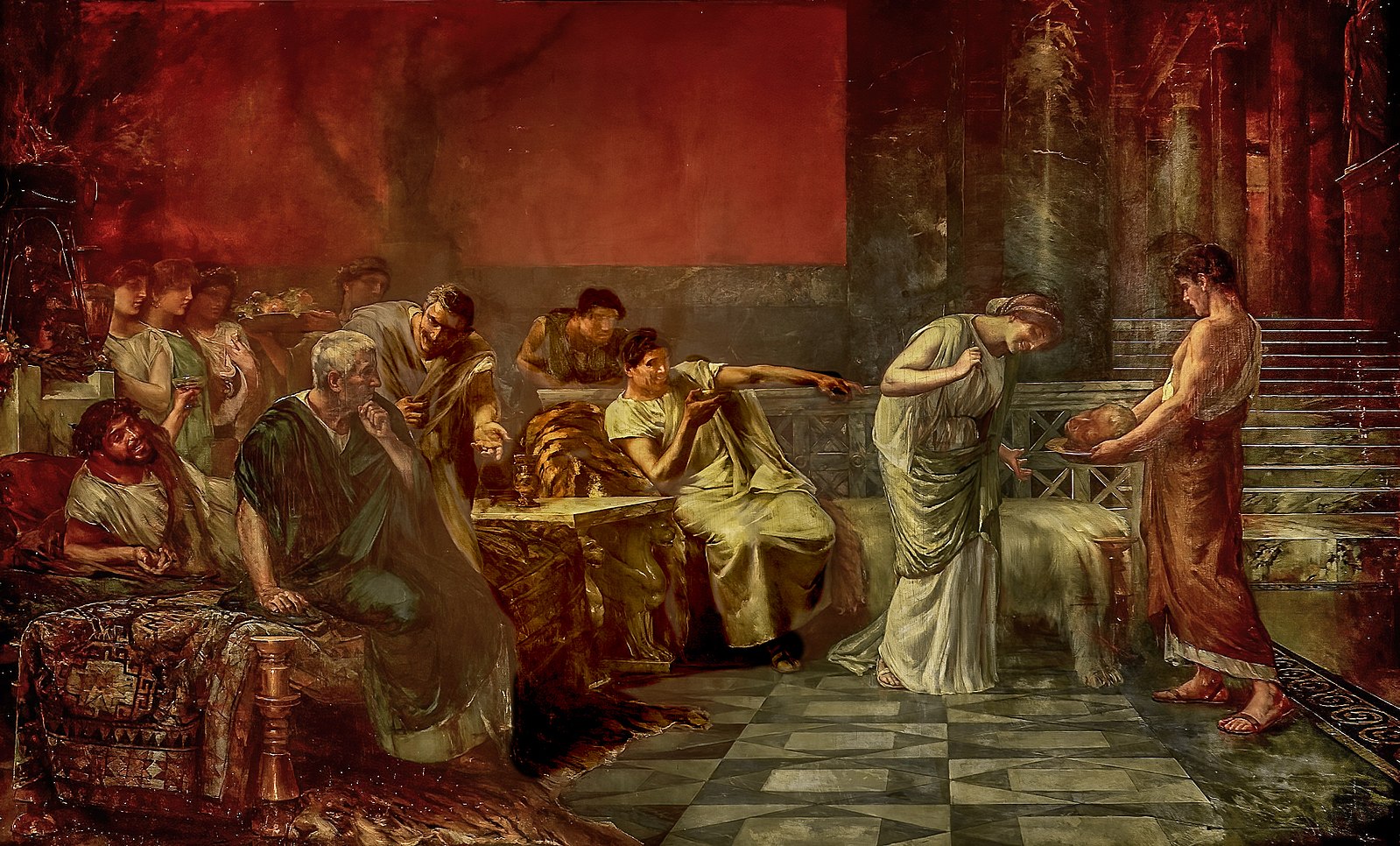
Maura y Montaner, The Vengeance of Fulvia (1888)
- Cicero as orator: 60 surviving courtroom & political speeches; philosophical & rhetorical writer; poetry (O fortunatam natam me consule Romam!)
- enormous influence on Jefferson & American founders (writings on personal liberty, constitutional republic, et al.)

GROUPS











